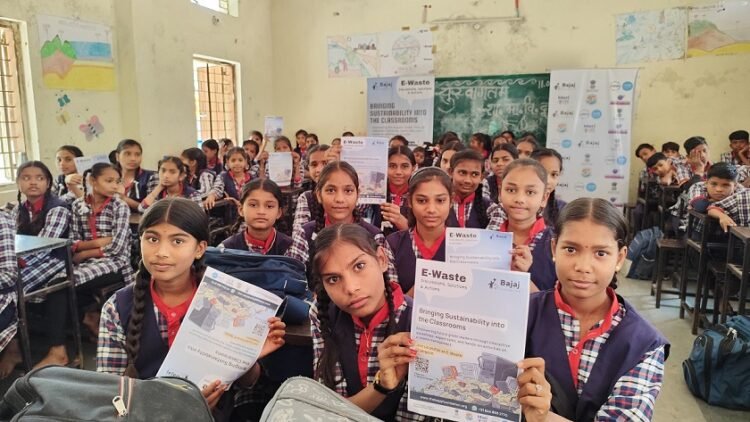NEW DELHI (India CSR): In a bold move to combat India’s growing e-waste problem, Bajaj Foundation has teamed up with UNICEF YuWaah to launch a nationwide awareness and reduction campaign. Supported by the Ministry of Environment, Forest and Climate Change (MoEF&CC) and the Department of School Education and Literacy (DoSEL), the initiative will reach over 100,000 students across 650 schools in Madhya Pradesh, Rajasthan, and Tamil Nadu. The campaign, launched on February 19, 2025, seeks to drive sustainable behavioral change among young minds, empowering them to become environmental stewards.
With India generating 2.6 million tonnes of e-waste annually—a figure projected to skyrocket to 82 million tonnes by 2030—this initiative couldn’t have come at a more critical time. By integrating e-waste education into schools, the campaign aims to create a ripple effect of awareness and action, starting with the youngest generation.
Why Focus on Students?
Students are the torchbearers of change, and this campaign recognizes their potential to drive meaningful environmental action. By targeting schools, the initiative leverages the existing framework of eco-clubs under Samagra Shiksha, aligning with the National Education Policy (2020)’s emphasis on environmental education.
The campaign will focus on 13 cities across three states, chosen for their active participation in eco-club initiatives. Through workshops, interactive sessions, and hands-on activities, students will learn about the environmental and health hazards of improper e-waste disposal and the importance of recycling.

A Multi-Pronged Approach
The campaign isn’t just about awareness—it’s about action. Each participating school will have dedicated e-waste collection points, where students can deposit old electronics like mobile phones, batteries, and chargers. These materials will then be transported to centralized collection hubs in each city, ensuring proper disposal through authorized recyclers.
Pankaj Bajaj, Founder & Director of Bajaj Foundation, emphasized the campaign’s dual impact: “By educating students about e-waste, we’re not only addressing the immediate problem of improper disposal but also inspiring long-term behavioral change. This initiative is about empowering young people to take responsibility for their environment.”
UNICEF YuWaah’s Role in Empowering Youth
UNICEF YuWaah, a platform dedicated to youth empowerment, is a key partner in this initiative. Abhishek Gupta, COO of YuWaah, highlighted the campaign’s alignment with Prime Minister Modi’s LiFE (Lifestyle for Environment) initiative. “This collaboration strengthens our commitment to creating a greener, more sustainable India. By equipping young people with knowledge and tools, we’re preparing them to be future leaders in environmental conservation,” he said.
A Step Toward a Greener Future
The campaign builds on the success of Mission LiFE, which promotes sustainable lifestyles. Currently, e-waste-focused initiatives make up only 7% of environmental actions in India, leaving a significant gap that this campaign aims to fill. By engaging students, the initiative not only addresses the e-waste crisis but also fosters a culture of environmental responsibility that can extend to families and communities.
As the campaign rolls out, it promises to set a precedent for scalable, youth-driven environmental action. For students, it’s an opportunity to learn, act, and lead the way toward a cleaner, greener India.







